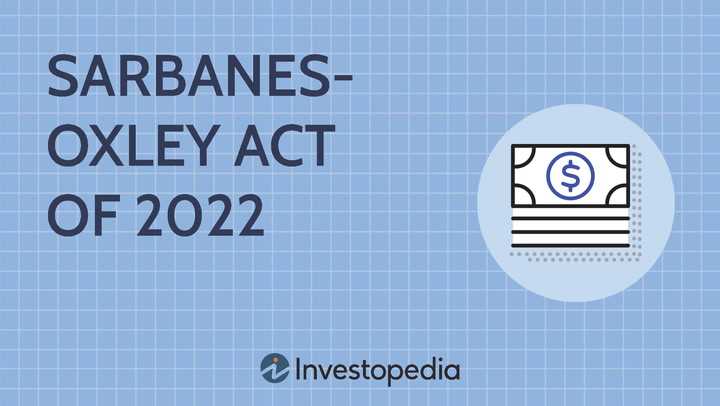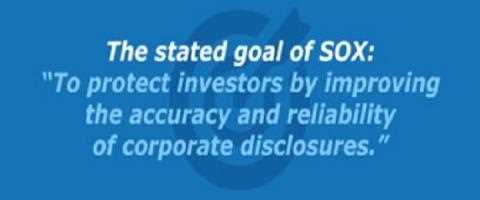Sarbanes-Oxley Act: Investor Protection Explained
One of the key provisions of the Sarbanes-Oxley Act is the requirement for companies to establish and maintain internal controls over financial reporting. This means that companies must have processes and systems in place to ensure the accuracy and integrity of their financial statements. These internal controls are subject to external audits to ensure compliance.
Another important aspect of the Sarbanes-Oxley Act is the establishment of the Public Company Accounting Oversight Board (PCAOB). The PCAOB is responsible for overseeing the audits of public companies and ensuring that auditors adhere to professional standards. This helps to enhance the quality and reliability of financial statements.
The Sarbanes-Oxley Act also introduced stricter penalties for corporate fraud and misconduct. Executives who knowingly certify false financial statements can face criminal penalties, including fines and imprisonment. This increased accountability and deterrence has helped to restore investor confidence in the financial markets.
Overall, the Sarbanes-Oxley Act has had a significant impact on investor protection. It has increased transparency and accountability in corporate financial reporting, which is crucial for investors to make informed decisions. By improving the accuracy and reliability of financial statements, the act has helped to prevent future accounting scandals and promote trust in the financial markets.
| Benefits of the Sarbanes-Oxley Act | Challenges of the Sarbanes-Oxley Act |
|---|---|
| Enhanced investor confidence | Increased compliance costs for companies |
| Improved corporate governance | Potential burden on small businesses |
| Greater transparency in financial reporting | Complexity of regulatory requirements |
Overview of the Sarbanes-Oxley Act

The main objective of the Sarbanes-Oxley Act is to protect investors by improving the accuracy and reliability of corporate disclosures. It aims to enhance transparency, accountability, and corporate governance practices within public companies. The act established new standards for financial reporting, auditing, and internal controls, with the goal of preventing fraudulent activities and ensuring the integrity of financial statements.
Key Provisions

One of the key provisions of the Sarbanes-Oxley Act is the requirement for companies to establish and maintain internal controls over financial reporting. This includes implementing procedures and controls to ensure the accuracy and completeness of financial statements. Companies are also required to regularly assess and report on the effectiveness of their internal controls.
Another important provision of the Sarbanes-Oxley Act is the requirement for CEOs and CFOs to certify the accuracy of financial statements. They are required to personally certify that the financial statements do not contain any material misstatements or omissions and that they fairly present the financial condition and results of operations of the company.
Impact
The Sarbanes-Oxley Act has had a significant impact on the accounting profession and corporate governance practices. It has increased the level of scrutiny and accountability for public companies, as well as for their auditors and executives. The act has also led to increased costs for compliance and reporting, as companies have had to invest in new systems and processes to meet the requirements.
While the act has been effective in improving financial reporting and investor protection, it has also faced criticism for being overly burdensome and costly, particularly for smaller companies. Some argue that the act has resulted in a decrease in initial public offerings (IPOs) and has made it more difficult for small businesses to access capital markets.
Overall, the Sarbanes-Oxley Act has played a crucial role in restoring investor confidence and promoting transparency in the financial markets. It has set higher standards for corporate governance and financial reporting, and has helped to prevent fraudulent activities that can harm investors and the economy as a whole.
Importance of Investor Protection
Investor protection is a crucial aspect of any financial system. It ensures that investors have confidence in the integrity and transparency of the market, which in turn encourages investment and contributes to economic growth. The Sarbanes-Oxley Act (SOX) plays a vital role in safeguarding the interests of investors by imposing stringent regulations on companies and enhancing corporate governance.
One of the key reasons why investor protection is important is because it helps prevent fraudulent activities and financial misconduct. By requiring companies to maintain accurate and reliable financial records, SOX helps to detect and deter fraudulent practices such as accounting fraud and insider trading. This not only protects investors from potential losses but also maintains the overall trust and credibility of the financial markets.
Investor protection also promotes fair and transparent financial reporting. SOX mandates that companies establish and maintain effective internal controls over financial reporting, ensuring that financial statements are accurate and complete. This helps investors make informed decisions based on reliable information, reducing the risk of investing in companies with misleading or false financial statements.
Furthermore, investor protection encourages accountability and ethical behavior among corporate executives. SOX requires CEOs and CFOs to certify the accuracy of financial statements, making them personally liable for any false or misleading information. This accountability ensures that executives act in the best interests of shareholders and reduces the likelihood of corporate scandals and misconduct.
Another important aspect of investor protection is the establishment of independent audit committees. SOX mandates that companies have independent directors on their audit committees, who are responsible for overseeing the financial reporting process and ensuring compliance with regulations. This independence helps prevent conflicts of interest and ensures that auditors can perform their duties objectively, further enhancing investor confidence.
Impact of the Sarbanes-Oxley Act on Accounting
The Sarbanes-Oxley Act (SOX) has had a significant impact on the accounting profession since its enactment in 2002. The legislation was introduced in response to a series of high-profile accounting scandals, such as Enron and WorldCom, which eroded investor confidence and highlighted the need for stronger financial oversight and accountability.
One of the main objectives of the Sarbanes-Oxley Act was to improve the accuracy and reliability of financial reporting. The act introduced stricter regulations and requirements for public companies, particularly in relation to internal controls and corporate governance. These measures were aimed at preventing fraudulent activities and ensuring that financial statements provide a true and fair view of a company’s financial position.
Under the Sarbanes-Oxley Act, public companies are required to establish and maintain effective internal control systems to ensure the integrity of their financial reporting. This includes implementing controls to safeguard assets, detect and prevent fraud, and ensure the accuracy and completeness of financial records. Companies are also required to regularly assess and report on the effectiveness of their internal controls, providing greater transparency and accountability to investors.
Another significant impact of the Sarbanes-Oxley Act on accounting is the increased role and responsibility of auditors. The act established the Public Company Accounting Oversight Board (PCAOB), which oversees the auditing profession and sets auditing standards for public companies. Auditors are now required to adhere to stricter guidelines and perform more thorough and independent audits to provide assurance on the accuracy and reliability of financial statements.
The Sarbanes-Oxley Act also introduced significant changes to corporate governance practices. It requires public companies to have independent audit committees composed of outside directors who oversee the financial reporting process and the relationship with auditors. This separation of duties and increased independence helps to ensure that financial reporting is not compromised by conflicts of interest.
Overall, the Sarbanes-Oxley Act has had a profound impact on the accounting profession. It has resulted in increased scrutiny and regulation, as well as greater transparency and accountability in financial reporting. While the act has imposed additional costs and administrative burdens on companies, it has also helped to restore investor confidence and strengthen the integrity of the financial markets.
| Impact of the Sarbanes-Oxley Act on Accounting |
|---|
| Improved accuracy and reliability of financial reporting |
| Stricter regulations and requirements for internal controls and corporate governance |
| Establishment and maintenance of effective internal control systems |
| Increased role and responsibility of auditors |
| Introduction of independent audit committees |
| Increased scrutiny and regulation |
| Greater transparency and accountability in financial reporting |

Emily Bibb simplifies finance through bestselling books and articles, bridging complex concepts for everyday understanding. Engaging audiences via social media, she shares insights for financial success. Active in seminars and philanthropy, Bibb aims to create a more financially informed society, driven by her passion for empowering others.
